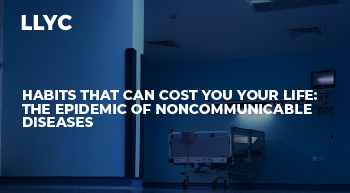-
TrendsHealthcare
-
SectorHealthcare and Pharmaceutical IndustryLifestyle
-
CountriesGlobal
Those who have heard of the “Ice Bucket Challenge” will surely remember how some celebrities went viral on social media by pouring a bucket of ice water over themselves, with the intention of creating awareness and raising funds for the fight against amyotrophic lateral sclerosis (ALS). This initiative achieved the participation of 17 million people with donations from around the world, raising more than 115 million dollars in the US alone. Social media has the ability to connect with millions of people to highlight projects that can influence the behavior of different audiences, including the youngest.
Noncommunicable Diseases impact life quality of millions of people and generate high expenses for Healthcare Systems. Although it has been widely discussed and public policies and communication campaigns have been designed to try to stop the impact of these diseases, the epidemic continues to grow. New alternatives and channels must be considered urgently and we must bring our society and experts together to fight against this battle.
For this report, policies and action programs (documental research), perceptions and opinions (interviews with experts) focused on the cure of diseases such as diabetes, cardiovascular diseases, respiratory diseases and cancer named by the Panamerican Health Organization (PAHO)– such as the major epidemic of our time- were analyzed. The evaluation focused on whether or not the plans and projects are enough to contain the negative impact on the life quality of those who suffer from them, and if this will help reduce the elevated costs for Healthcare Systems.
We focus on understanding the impact of modifiable factors and how to get people to take action to improve their life quality. In addition, we review mortality rates, investment in healthcare, and the cost that these diseases represent for health systems.
In order to explore alternatives to achieve an optimal strategy that motivates changes in habits and complements government plans and programs, we consulted 38 experts in public health, physicians, business representatives and patient groups in 7 Latin American countries. This report summarizes the main findings and suggests actions from the perspective of communication, public affairs and digital marketing to stop this epidemic, achieve a healthier society and reduce the impact of these diseases for health systems.
Authors
Javier Marín
Ana Lluch




